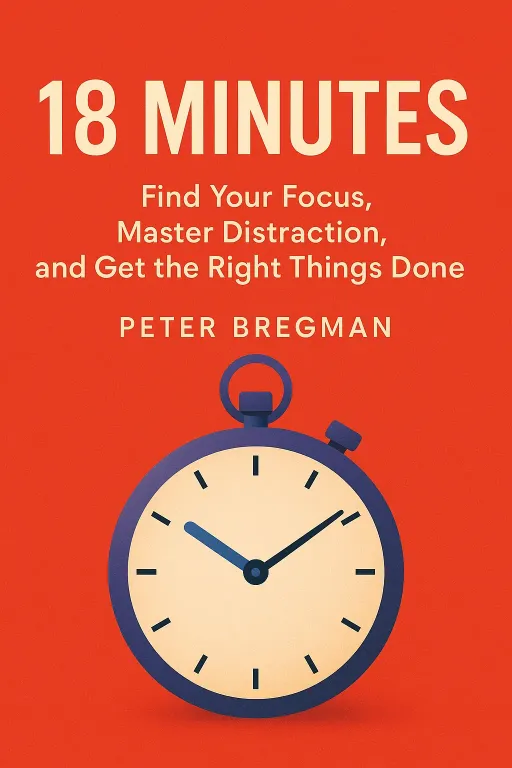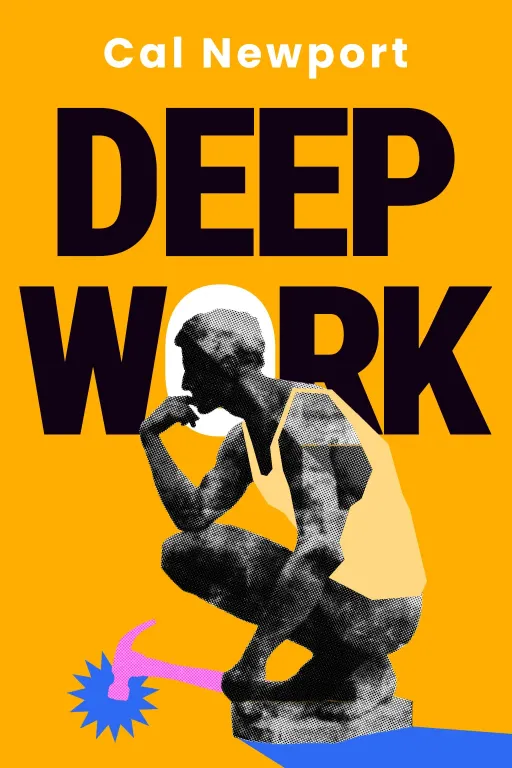
The 18-Minute Focus Fix
10 minFind Your Focus, Master Distraction, and Get the Right Things Done
Golden Hook & Introduction
SECTION
Mark: A study by the Virginia Tech Transportation Institute found that in 80% of car crashes, the driver was distracted in the three seconds before impact. Three seconds. Michelle: Wow. That’s terrifying. It makes you wonder, what are the 'car crashes' in our own work lives? The missed deadlines, the botched presentations, the angry clients... and what's distracting us in those three seconds right before they happen? Mark: That is the central question in Peter Bregman's fantastic book, 18 Minutes: Find Your Focus, Master Distraction, and Get the Right Things Done. Michelle: Bregman is an interesting guy to be writing this. He's a high-powered CEO coach for places like Goldman Sachs, but he started his career teaching leadership on grueling wilderness expeditions. So he's seen focus—and the lack of it—in some pretty high-stakes environments. Mark: Exactly. And the book was widely acclaimed, even named a best business book of the year by NPR. He argues that the solution to our modern distraction isn't some complex, color-coded system. It’s a simple, daily 18-minute ritual. Michelle: Okay, I’m already skeptical. Just 18 minutes to fix my entire chaotic life? We’ll see. Mark: Well, it all starts with a problem I think every single person listening can relate to.
The Tyranny of the Urgent: Why We're Busy But Not Productive
SECTION
Mark: Bregman tells this story about a woman named Molly. It's her first day at a new job, head of learning and development at an investment bank. She’s excited, fresh start, clean slate. She sits down, logs into her computer, and opens her email. Michelle: Oh no. I can feel this in my bones. How bad is it? Mark: 385 unread messages. On her first day. Michelle: That’s my nightmare. That's every Monday morning. You feel like you're losing before you've even started. So what do you do? You just dive in and start answering, right? That’s what I would do. Mark: And that is precisely the trap. Bregman uses this great analogy from physics, Newton's First Law of Motion. An object in motion stays in motion. He says we get caught in this state of 'reactive inertia.' We just keep moving, answering emails, putting out fires, without ever stopping to ask if we're moving in the right direction. Michelle: That feels so true. You spend the whole day busy, but at 6 PM you look up and have no idea what you actually accomplished. Mark: He has another perfect story for that. A guy named Rajit sits down on a Wednesday morning to write a critical proposal for a new client. This is his number one priority. But then the phone rings. He takes the call. Then he sees an email notification. He answers it. He gets up to go to the bathroom, on the way back he chats with a colleague, then he remembers he needs to book a flight for a personal trip. Before he knows it, his assistant is knocking on the door to remind him about his lunch appointment. Michelle: And the proposal? Mark: Not a single word written. The entire morning, gone. He was busy, but completely unproductive on the one thing that mattered. Michelle: Okay, but those things feel important! A phone call from a client, an email from your boss... you can't just ignore them. That feels like career suicide. Mark: And this is Bregman's foundational idea. The solution isn't to ignore them. It's to create a tiny space between the stimulus and your response. He calls it The Pause. Michelle: A pause? What does that even look like in the real world? Mark: It can be as simple as taking one deep breath before you reply to a provocative email. Bregman tells this incredible story about a client of his named Luigi. He missed a meeting with Luigi due to a scheduling mix-up. Later that day, Luigi sees him in the hallway and just starts yelling at him, publicly. Michelle: Oh, that's awful. My first instinct would be to get defensive and yell right back. Mark: His was too. He said his heart rate shot up, adrenaline was flowing. But instead of reacting, he just took one deep breath. It was probably only six seconds. But in that tiny pause, his rational brain, the prefrontal cortex, caught up with his emotional brain, the amygdala. Michelle: And what happened? Mark: Instead of yelling back, he walked over calmly and said, "Luigi, you're right to be upset. I am so sorry. I messed up." And the whole situation deflated. They resolved it in minutes. That six-second pause saved the relationship and his dignity. It allowed him to see the situation for what it was—a mistake to be fixed—not a personal attack to be fought. Michelle: Huh. So the pause isn't about stopping. It's about choosing your direction before you start moving again. Mark: Precisely. It’s the antidote to that reactive inertia that keeps us busy but unfulfilled. It’s the first step to stop feeling like Rajit with his unwritten proposal, or worse, like another character Bregman mentions, Marie, who's at her 25th high school reunion. Michelle: What about her? Mark: Someone asks her how her life is, and she says, "I’m not unhappy. My work is fine. My family is fine. In fact, my whole life is fine. But that’s all it is: fine. I haven’t really done anything." Michelle: That's chilling. That's a quiet kind of car crash, isn't it? A life of just... fine. Okay, so the 'pause' is the mindset shift. But how do you build that into a day that's already packed? That's where the 18 minutes come in, right?
The 18-Minute Architecture for Intentionality
SECTION
Mark: Exactly. The pause gives you perspective, but the 18-minute plan gives you structure. It's the architecture for your day. It’s broken into three simple parts. Michelle: Lay it on me. I need this. Mark: Step one is the Morning 5 Minutes. Before you even look at your email, you sit down with your calendar. You don't make a massive, unrealistic to-do list. Instead, you look at the day ahead and decide what would make this day a success. You schedule those things—the important, non-urgent stuff—into your calendar as if they were appointments. Michelle: So you’re not just listing tasks, you’re giving them a time and a place to live. Mark: You are creating a map for your day before you start driving. Bregman suggests you should have about five big-picture focus areas for your year—three work, two personal. Your daily plan should be a direct reflection of those. If one of your annual goals is "Write a book," then "Write for 1 hour" should be a block on your calendar. Michelle: That makes sense. It connects the big picture to the small actions. What's step two? Mark: Step two is the Hourly 1-Minute Refocus. This is the part people find weird at first. You set an alarm—a beep, a chime, whatever—to go off every hour of your workday. Michelle: Hold on. An hourly beep? That sounds like another distraction! I spend all day trying to get rid of notifications, not add more. What are you supposed to do in that one minute that's so magical? Mark: It's not about doing anything. It's about asking one question: "Am I using my time productively right now?" That's it. It’s a reset button. It’s the thing that pulls you out of the email rabbit hole or the pointless meeting and forces you to look at your map. Are you still on the right road? Michelle: I can see how that would be powerful. It’s like a little course correction every hour. Mark: Think of Bill, the guy from the book who was so bored in a meeting that he started checking his BlackBerry. His boss, Leticia, asks him a direct question, and he's completely lost. He has no idea what's going on. He wasted his own time and missed an opportunity. An hourly beep would have prompted him to ask, "Is being in this meeting the best use of my time? If so, I should engage. If not, I should find a way to leave." Michelle: Okay, I'm sold on the hourly beep. What's the final step? Mark: The final step is the Evening 5 Minutes. At the end of the day, you take five minutes to review. How did the day go against your plan? What worked? What challenges came up? What did you learn about yourself or your process? Michelle: It's a learning loop. Mark: It’s a powerful learning loop. Bregman tells a story about a high-performing executive named Julie who was on the verge of being fired because she was so difficult to work with. She was abrasive and dismissive. Through coaching, she started a daily practice of reflecting on her interactions. She’d ask herself, "How did that conversation go? What was my impact on that person?" Michelle: And did it work? Mark: It transformed her. She started seeing how her behavior was affecting others and began to change it. That simple, daily five-minute reflection saved her career. It’s about learning from your successes and your failures, so you don't keep repeating the same mistakes.
Synthesis & Takeaways
SECTION
Michelle: You know, when you lay it all out, it's not really about the 18 minutes themselves. It's about creating a simple, repeatable architecture for intention. The morning plan is the strategy, the hourly pings are the tactics to stay on course, and the evening review is the learning that makes you better for tomorrow. Mark: Exactly. Bregman's genius is that he's not selling a complicated system that requires a three-day seminar to learn. He's selling a ritual. It’s simple enough to stick, but powerful enough to create real change. And the ultimate goal isn't just to 'get more done' or achieve 'inbox zero.' Michelle: What is it then? Mark: It's to be able to look back at your day, your year, or your life and say that one simple, powerful phrase from the book: "I used my time well." That's the real win. Not just being busy, but being purposefully and effectively engaged in a life you chose. Michelle: I love that. It reframes productivity as a tool for fulfillment, not just efficiency. For anyone listening who feels overwhelmed by all this, maybe the one thing to try tomorrow is just the first five minutes. Mark: I agree. Michelle: Before you open your email, before the chaos begins, just sit down with your calendar and ask that one question: "What would make today a success?" Mark: A perfect place to start. This is Aibrary, signing off.









